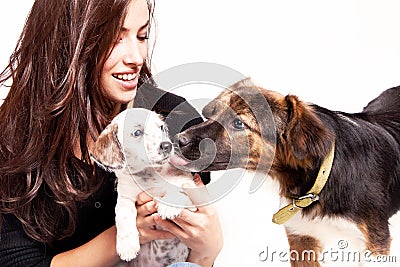♦ Think of the New Puppy
as a Newborn Infant.
It should help you accept the huge
burden of a puppy by perceiving him as a lonely, frightened baby. Think how
shocking the move to your house must be for a young pup, suddenly removed from
a warm bed full of squirming siblings and a mommy full of tasty milk. Suddenly
he’s all alone—and you’re the new parent bringing him to his new home, where
he’ll probably sleep alone in a crate. It’s quite an adjustment! So if in the
early days the puppy cries or whines or gnaws on things, try to be patient and
compassionate. He’s not doing it to irritate you, or because he’s “spoiled.”
Remember, he’s only a baby.
♦ Think of a New Older Dog as a Foster Child.
If you got the dog from a rescue
organization or county shelter, you may not learn much about her past. The dog
may have already been in multiple homes or other institutions (shelters,
breed-rescues). She cannot know whom she belongs to or what’s expected of her
or what’s going to happen next. That doesn’t mean you feel sorry for the dog
and let her have free rein without imposing any rules. On the contrary, knowing
that someone is in charge and is consistent is part of what will make her feel
secure in her new environment. Showing her what the boundaries are and creating
some sort of predictable schedule will help her make a successful transition
into your home.
Copyright © Tracie Hotchner – Originally appeared in The Dog Bible: Everything Your Dog Wants You to Know by Tracie Hotchner

Thanks for such a great post and the review, I am totally impressed! Keep stuff like this coming.
ReplyDeleteDog Lover